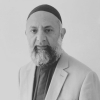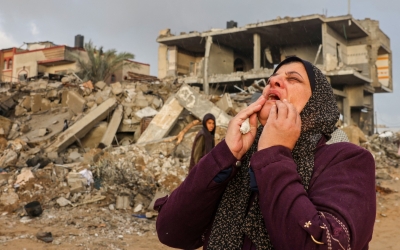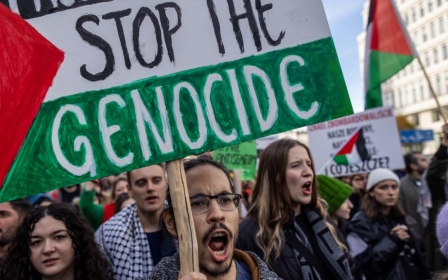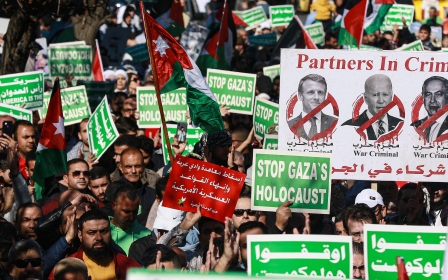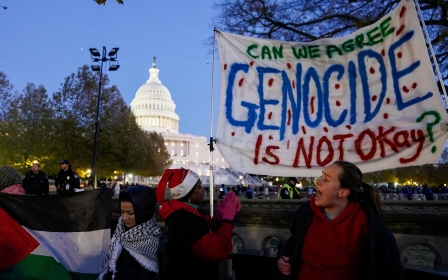War on Gaza: The weakness of the UN has inspired a global day of action
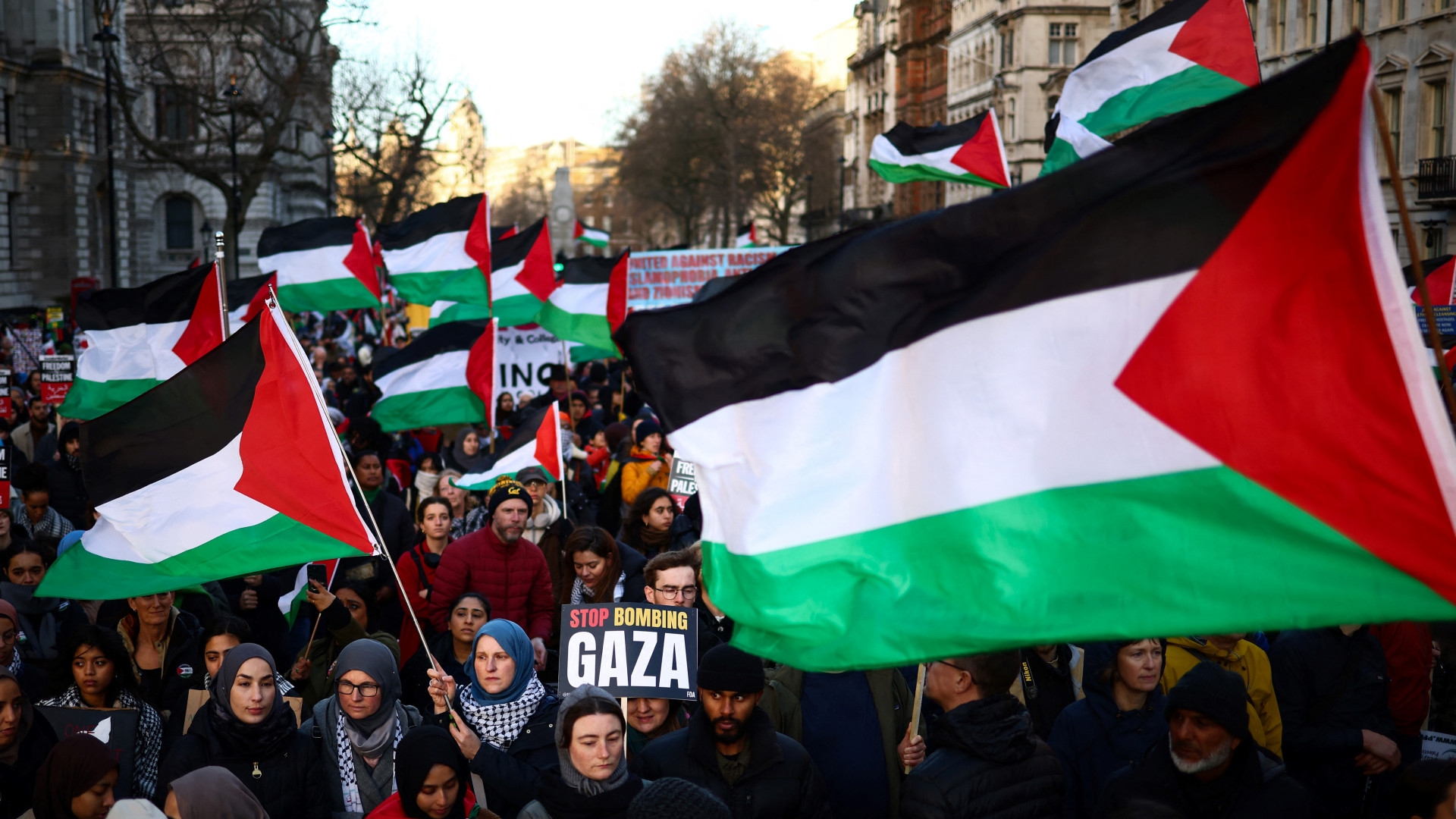
Global civil society is increasingly galvanising solidarity with the Palestinians as Israel’s genocide in Gaza continues. Peace activists from around the globe have designated 13 January as a global "day of action" for Gaza.
The call for global action follows nearly 12 weeks of demonstrations held in thousands of locations, from Malawi to the United States, including support from Icelanders, South Africans, and Native Americans.
The global day of action hopes to highlight the worldwide condemnation of Israel’s relentless bombing and siege of Gaza, which is claiming around 300 lives daily, the ongoing ethnic cleansing in the West Bank, the discrimination against Palestinians within Israel, the dehumanising of Palestinians by Israeli leaders, and Israel’s provocative attacks targeting Syria and Lebanon.
New MEE newsletter: Jerusalem Dispatch
Sign up to get the latest insights and analysis on Israel-Palestine, alongside Turkey Unpacked and other MEE newsletters
Besides exposing Israeli atrocities and aggressions, the global day of action will highlight several other issues. These include the global concern about the hierarchical structure of the United Nations that operates to benefit the geopolitical interests of the elite club members.
A flawed system
The UN is a two-tier system: the Security Council at the top and the General Assembly below it.
The global protests will shed light on how the US and UK hold justice hostage as they continuously shield Israel from accountability
The privileged Security Council comprises five permanent members, the US, UK, Russia, France and China, also known as the P5, with ten rotating members, elected by the General Assembly to serve on the council for two years. Only the P5 members have the power to veto a resolution.
The General Assembly is where most other countries sit, and where they may as well be spectators. Resolutions passed by the UN General Assembly are merely opinions and not binding. At best, they can only indicate their frustration with the P5.
As P5 members, the US and the UK have been obstructing the calls by the rest of the nations of the world for a ceasefire in Gaza.
A global day of protest thus serves as a powerful tool for exposing this unfair and ineffective order. It further sheds light on how the US and UK governments hold justice hostage and the world at ransom as they continuously shield Israel from accountability.
Follow Middle East Eye's live coverage of the Israel-Palestine war
By exposing this flawed system, the protesters hope to empower other countries with moral independence to move beyond support at the UN. The global day of action calls on leaders to impose sanctions, exert economic pressure and take Israel to the International Court of Justice for crimes against humanity and genocide.
Anti-war protests in the 1960s and '70s against the Vietnam War helped bring an end to the US attacks. The protests against the war on Iraq witnessed millions of people around the world participate. Although they did not stop the war, they have been instrumental in denouncing those involved as warmongers and pariahs.
Ironically, it is more than two decades since the anti-Iraq War protests of 2003 that the world is again being asked to support justice and peace. As in the past, the aim is to bolster international institutions like the UN and emancipate the nations of the world from the clutches of US warmongering dictates.
A dedicated day of global protest for Gaza has the added value of increasing the visibility of the genocide, challenging the Israeli dehumanising discourse and showing the breadth of global solidarity. This, in turn, exerts pressure on the handful of Israeli allies and empowers the majority of nations to bring an end to the Israeli genocide.
People's power
The last three months have shown that the Nakba (catastrophe) never ended and its most acute manifestation of 1948 is returning even more aggressively. This is despite the slogans of "never again", the Universal Declaration of Human Rights, international law, the Geneva Conventions, and the worldwide promotion of democratic ideals.
People’s power in the form of the anti-apartheid movement from the 1970s to the 1990s that ended apartheid in South Africa, despite Pretoria being supported by the US and UK, is needed today more than ever.
The Israeli attacks on Gaza are generating destruction comparable in scale to the most devastating wars of the last century. By mid-December, Israel had dropped 29,000 bombs, munitions and shells on Gaza.
Nearly 70 percent of Gaza’s 439,000 homes have been completely or partially destroyed. This is equivalent to destroying cities like Boston, Helsinki, Rotterdam and Leeds.
According to the United Nations, Israel’s war in Gaza has left half of the population of about 2.2 million at risk of starvation and 90 percent say that they regularly go without food for a whole day.
Further, the World Health Organisation reports that Israeli attacks on sanitary infrastructures are resulting in the spread of diseases that may ultimately kill more people than Israel’s bombs.
The global day of action, as such, is the realisation that people’s efforts are required to end the genocide in Gaza. It is about ordinary people demanding that their governments and institutions shift away from war and usher in a humane global order of equity and justice.
For these reasons and more, we are already witnessing groups from Malaysia, South Africa, India, and across the Americas, Asia and Europe starting to mobilise for the 13 January.
The views expressed in this article belong to the author and do not necessarily reflect the editorial policy of Middle East Eye.
Middle East Eye delivers independent and unrivalled coverage and analysis of the Middle East, North Africa and beyond. To learn more about republishing this content and the associated fees, please fill out this form. More about MEE can be found here.


